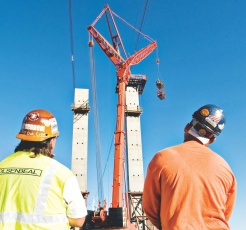The second major eminent domain decision in 13 months for the New York State Court of Appeals has Columbia University poised to move ahead on a $6.3 billion expansion in the Manhattanville neighborhood of Harlem.

In a unanimous decision, the state’s highest court overturned an earlier ruling that prevented the state from seizing by eminent domain a small amount of property currently home to private businesses. Columbia already owned most of the land in the proposed 17-acre development area.
The ruling came just more than a year after another major battle over eminent domain was decided in May 2009 by the same court regarding the $4 billion Atlantic Yards mega-development in Brooklyn.
“The proposed project here is at least as compelling in its civic dimension as [Atlantic Yards],” the court said in its opinion, written by Judge Carmen Beauchamp Ciparick. “The advancement of higher education is the quintessential example of a ‘civic purpose.’
The university announced in 2002 plans to expand its campus through the construction of 16 brand new science, business and arts buildings between West 125th Street and West 134th Street and from west from Broadway to the Hudson River. Warehouses, auto shops and dormant factories currently dominate the area. Plans also include the renovation of an existing building and a multi-level, below-grade support space over about 6.8 million sq ft, which will also include about two acres of open public space a retail market and widened sidewalks.
The expansion plans have been controversial from the start. After being initially opposed by tenant groups and community boards, the Empire State Development Corporation [ESDC] in 2008 declared the expansion zone blighted and approved the use of eminent domain, clearing the way for the university to seize properties from the remaining private landowners who had not reached deals with Columbia.
Work on the expansion project is set to begin this year and is expected to create 14,000 construction jobs over the next 25 years, according to the ESDC.
div id="articleExtras"
Post a comment to this article
Report Abusive Comment